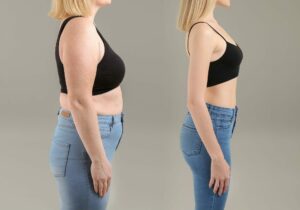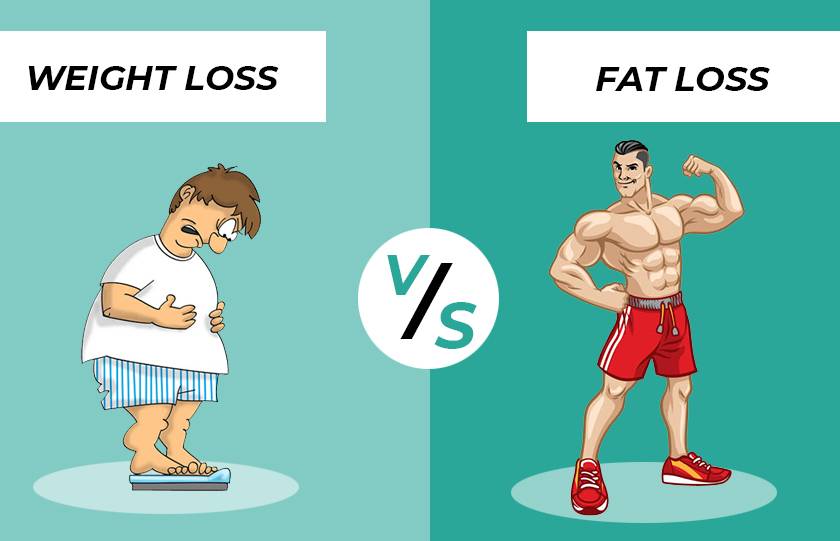When it comes to weight loss, there are two main types of people: those who want to lose weight and those who want to lose fat. What’s the difference? And which one is better? In this blog post, we will discuss the differences between weight loss vs fat loss, and help you decide which type of goal is right for you!
Contents
Weight Loss vs Fat Loss
Most people think that weight loss and fat loss are one and the same. However, there is a big difference between the two! We have defined fat loss and weight loss separately to give you a clear explanation of what is what. Let’s take a look at the difference between weight loss vs fat loss.
Weight Loss
 Weight is defined as the force that gravity exerts on an object. In other words, it is the measurement of how much mass an object has. When you lose weight, you are losing the amount of mass that makes up your body. This can be accomplished by losing water weight, muscle mass, or fat. Weight loss is usually temporary and can be achieved through dieting, exercise, or a combination of both.
Weight is defined as the force that gravity exerts on an object. In other words, it is the measurement of how much mass an object has. When you lose weight, you are losing the amount of mass that makes up your body. This can be accomplished by losing water weight, muscle mass, or fat. Weight loss is usually temporary and can be achieved through dieting, exercise, or a combination of both.
Fat Loss
 Fat is defined as a type of tissue that stores energy in the form of lipids. Fat is essential for the body to function properly. When you lose fat, you are losing the stored energy in your body. This can be accomplished by burning more calories than you consume, exercising, or a combination of both. Fat loss is usually permanent and can be achieved through dieting, exercise, or a combination of both.
Fat is defined as a type of tissue that stores energy in the form of lipids. Fat is essential for the body to function properly. When you lose fat, you are losing the stored energy in your body. This can be accomplished by burning more calories than you consume, exercising, or a combination of both. Fat loss is usually permanent and can be achieved through dieting, exercise, or a combination of both.
How To Identify?
There are a few key ways to help you identify whether you are losing weight or fat. Some of the ways in which you can tell the difference are:
The way your clothes fit
This is usually a good indicator of whether you are losing weight or fat. If your clothes are fitting more loosely than before, then it is likely that you are losing fat. However, if your clothes seem to be fitting the same or tighter than before, then it is likely that you are just losing weight. This is because when you lose weight, you lose both fat and muscle. However, when you lose fat, you just lose fat.
How you look in the mirror
This is another good way to tell whether you are losing weight or fat. If you look in the mirror and see that you are smaller overall, then it is likely that you are losing fat. However, if you look in the mirror and see that you are the same size or even larger, then it is likely that you are just losing weight. It will also be helpful to take pictures of yourself periodically so that you can see the changes (or lack thereof) over time.
Your performance
If you are losing weight but not fat, then your performance will probably suffer. This is because when you lose weight, you lose both muscle mass and fat mass. Muscle mass is necessary for optimal performance. However, when you lose fat but not weight, your muscle mass stays the same or increases while your fat mass decreases. This means that your performance will improve or stay the same.
Body measurements
 Another way to help identify whether you are losing weight or fat is to take some body measurements. Using a tape measure, take measurements of your chest, waist, hips, and thighs. If you notice that these measurements are all decreasing, then it is likely that you are losing both weight and fat. However, if only some of the measurements decrease while others stay the same or increase, then it is likely that you are only losing weight.
Another way to help identify whether you are losing weight or fat is to take some body measurements. Using a tape measure, take measurements of your chest, waist, hips, and thighs. If you notice that these measurements are all decreasing, then it is likely that you are losing both weight and fat. However, if only some of the measurements decrease while others stay the same or increase, then it is likely that you are only losing weight.
Body composition
This refers to the ratio of fat to muscle in your body. You can have this checked by a fitness professional using skinfold calipers, or you can use at-home devices such as bioelectrical impedance scales. If you notice that your body fat percentage is decreasing but your weight stays the same, then it is likely that you are losing fat and gaining muscle. However, if your weight decreases but your body fat percentage stays the same, then it is likely that you are just losing weight.
So there you have it! These are some key ways to help you identify whether you are losing weight or fat. Remember, it is important to focus on losing fat, not just weight, in order to improve your overall health and fitness.
Which One Is Better?
Now that you know the truth behind weight loss vs fat loss, you might be wondering which one is better. The answer to this question depends on your goals. If your goal is to improve your health, then you should focus on losing fat. This is because carrying around excess body fat can lead to a number of health problems, such as heart disease, diabetes, and high blood pressure.
On the other hand, if your goal is to improve your performance, then you should focus on losing weight. This is because carrying around excess body weight can make it more difficult to perform at your best. Moreover, losing muscle mass can also negatively impact your performance.
Remember that you can lose both weight and fat at the same time. However, it is usually best to focus on one or the other depending on your goals. And, as always, be sure to consult with a healthcare professional before starting any weight loss or fitness program.
How To Lose Weight And Fat?
Losing weight and fat are two different things. However, they both require making some changes to your lifestyle. Some common changes that can help you lose weight and fat include:
Eating a healthy diet
 Eating healthy foods is important for both losing weight and fat. A healthy diet includes a variety of nutrient-rich foods, such as:
Eating healthy foods is important for both losing weight and fat. A healthy diet includes a variety of nutrient-rich foods, such as:
- Fruits and vegetables
- Whole grains
- Lean protein
- Healthy fats
You can try healthy recipes at home or look for healthy options when dining out. It is also important to limit your intake of processed foods, sugary drinks, and alcohol. If you need help making healthy changes to your diet, consider meeting with a registered dietitian.
Exercising regularly
Engaging in regular physical activity is important for both losing weight and fat. Some great exercises to help you lose weight and fat include:
- Walking
- Jogging
- Running
- Swimming
- Hitting the gym
It is important to find an exercise that you enjoy so that you are more likely to stick with it. Exercise can also help improve your overall health and well-being. If you need help getting started with exercising, consider hiring a personal trainer or joining a gym.
Reducing your stress levels
Stress can lead to weight gain, so it is important to find ways to manage your stress. Some great ways to reduce stress include:
- Yoga
- Meditation
- Deep breathing exercises
- Spending time with friends and family
- Getting a massage
- Doing something you enjoy
If you are struggling to manage your stress, consider talking to a therapist or counselor. They can help you develop healthy coping mechanisms. Reducing your stress levels will surely help you on your journey to lose weight and fat.
Getting enough sleep
Sleep is important for both your physical and mental health. No matter how busy you are, be sure to get at least seven hours of sleep each night. If you have trouble sleeping, consider implementing some healthy sleep habits, such as:
- Turning off electronics before bed
- Reading a book before bed
- Avoiding caffeine in the evening
- Creating a relaxing bedtime routine
- Keeping a cool, comfortable environment in your bedroom
Always try to get a good night’s sleep, as it will help you on your journey to lose weight and fat. It is also important to consult with a healthcare professional if you are having difficulty sleeping.
Limiting your alcohol intake
 Drinking alcohol can lead to weight gain, so it is important to limit your intake. Alcohol is high in calories and can interfere with weight loss. If you choose to drink alcohol, do so in moderation and be sure to select healthier options, such as:
Drinking alcohol can lead to weight gain, so it is important to limit your intake. Alcohol is high in calories and can interfere with weight loss. If you choose to drink alcohol, do so in moderation and be sure to select healthier options, such as:
- Light beer
- Wine
- Spirits
Avoid high-calorie mixed drinks and cocktails. For healthy adults, moderate drinking is defined as:
- Two drinks per day for men
- One drink per day for women
It is also important to note that alcohol can have different effects on different people. So, if you are trying to lose weight or fat, it is best to avoid alcohol altogether.
These were some of the common approaches to losing weight and fat both. Follow these lifestyle changes and see your body getting transformed into a healthy and fit one. In case, you are unable to lose weight and fat through the above-mentioned lifestyle changes, talk to a healthcare professional. They can help you with personalized care for better outcome.
Conclusion
The bottom line is that weight loss vs fat loss are two very different things. Weight loss simply refers to the total amount of mass that you are losing, while fat loss specifically refers to the amount of body fat that you are shedding. While it is possible to lose weight without actually losing any body fat (such as when you urinate or sweat), it is not possible to lose fat without also losing some weight.
Therefore, if your goal is purely aesthetic (i.e. you want to look thinner/leaner), then your focus should be on maximizing fat loss while minimizing weight loss. On the other hand, if your goal is health-related (i.e. you want to lower your body fat percentage or improve your metabolic health), then you should focus on maximizing weight loss while minimizing fat loss.
If you need more information on sustainable weight loss and fat loss, contact Mantra Care. We can help you develop a healthy weight loss program that is tailored to your specific needs and goals. You can also get in touch with our nutrition experts and expert dietitians through our online nutrition counseling, who can guide you through the process and help you achieve your fitness goals.


